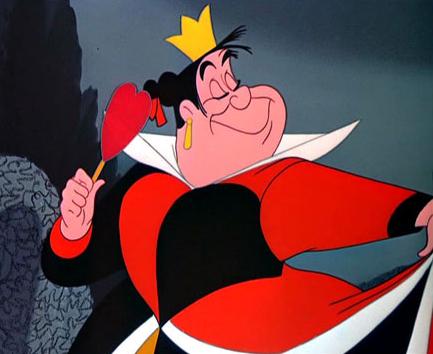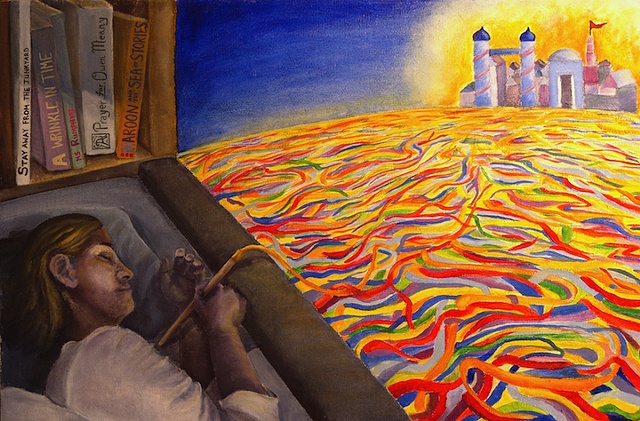I recently finished reading through Chapters Five to Eight of “Haroun and the Sea of Stories”, and my opinion of the book has stayed the same. The plot does not fail to satisfy, introducing a new theme or face each time a fresh chapter unfolds. The same can be said for the unique charm of the story’s world, which took off from the grounds of reality in the beginning and now soars high above, floating through clouds of imagination.
While the early chapters focus on story-telling, the middle chapters of “Haroun and the Sea of Stories” rely more on the themes of language boundaries and the division that comes with it. This theme is most apparent in Chapter Eight, “Shadow Warriors”, where the character Mudra struggles to introduce himself:
‘Gogogol,’ … ‘Kafkafka,’
In great bewilderment, Prince Bolo retorts with:
‘Eh? What’s that? What’s the fellow saying?’ … ‘I can’t make out a single word.’
Another character, Blabbermouth, has an interesting commentary on Bolo’s remarks:
‘What a poser, I swear,’ … ‘Our Bolo. Talking so big and rude because he thinks it’ll stop us from noticing the he’s scared out of his pants.’
This is quite an intriguing observation. In the previous chapter, the Shadow Warrior is described physically in great detail, with many of his Chup-like characteristics contrasting with their Gup counterparts. While the Guppees are light, the Chupwalas are dark, and etc…

These cultural differences paired with Mudra’s poor verbal communication erects a wall between him and Prince Bolo. Bolo fears the Chupwalas simply because they are foreign and unbeknownst to him, which poses a threat. Such a simple barrier of communication is what drives humans into war and other conflicts, and Blabbermouth recognizes this wall in an instant.
Luckily, most of the Guppee gang is more open-minded than Bolo and willing to give Mudra a chance. It is soon discovered that he speaks fluently in a sort of sign language that Rashid is familiar with. After some translations, useful intel is recieved:
‘Mudra is a friend. Also… we have none other than the Champion Warrior of Chup, considered by most Chupwalas to be second ion authority only to Cultmaster Khattam-Shud himself.’ … ‘Mudra is no longer an ally of the Cultmaster’s. He has become disgusted with the growing cruelty and fanaticism of the Cult of the tongueless ice-idol Bezaban, and has broken off relations with Khattam-Shud…’
The team now has the enemy’s second-hand man allied with them, all because of a little sign language and the benefit of the doubt. Not so scary now, eh Bolo? Of course, Mudra could be lying, but that is a topic for another day.
Salmon Rushdie has woven many threads of other tales into “Haroun and the Sea of Stories” in the form of allusion. Rushdie incorporates allusions to borrow motifs, pay tribute, and leave clues of his inspirations. This pdf has a great list that covers most of the story’s main allusions, and some of these can be observed within Chapters Five to Eight.
One of the most apparent references found in the middle of the book alludes to “Alice in Wonderland”. The army of the Guppees is composed of Pages that make up Chapters and Volumes, a military structure very reminiscent of the army of Cards that make up the Decks. The Guppee queen also mirrors the Queen of Cards, both sharing a few… defining features.
One of the driving questions behind this book is an inquiry of its own purpose:
‘What’s the point in telling stories that aren’t even true?’
Rushdie plants this question in the reader’s mind during Chapter One, which gives it plenty of time to grow and fester in the back of the brain. After some pondering, I have found a relatively straightforward answer to this question. Fictional stories teach lessons and provide humans with something that most could not stay happy and sane without: entertainment.
“Haroun and the Sea of Stories” expands on this answer throughout the story in a few ways. First and most obviously, Rushdie takes something that is seemingly-not true to Haroun – one of his father’s stories – and makes it real, sending Haroun to the world itself. This concept relates to the law of attraction, which states that thought and desire ultimately design our reality.
Salman Rushdie also uses numerous metaphors to support the themes he explains to the reader. Such metaphors include:
- The Story Waters serving as a source of spirit, showing Rashid depressed without them
- The sad condition of the Chupwalas, who have no tongue to tell their stories in
- The happy-go-lucky Guppees, who live virtually care-free because of their constant chattering
This Wednesday, my English class had another discussion concerning the deeper meanings of the book. My discussion group delved into a particularly insightful debate about the relationship between storytelling and juggling. In Chapter , Haroun talks to Blabbermouth about this idea:
‘I always though storytelling was like juggling,’ … ‘You keep a lot of different tales in the air, and juggle them up and down, and if you’re good you don’t drop any. So maybe juggling is a kind of storytelling, too.’
When this topic was first brought up, the group shut it down, thinking that everything was already explained in the passage. After another moment of consideration, many of us exploded with ideas. We made many connections between juggling and stories:
- Both take great skill and concentration
- No one part can be left out without ruining the rest
- The complexity and intensity of each act gradually increases
- The acts are always similar each time, but just different enough to captivate the audience
- Different types appeal to different audiences
Once the discussion was over, it became harder to point out differences between storytelling and juggling. That is the sign of a quality discussion.
In conclusion: good read, great metaphors, amazing discussion.


D,
Your takeaway from the Socratic Seminar clear. So much to learn there about juggling and storytelling. Too, I appreciated this: “These cultural differences paired with Mudra’s poor verbal communication erects a wall between him and Prince Bolo.” It’s an astute and specific and figurative all at once. I can’t help but pay attention.
LikeLike